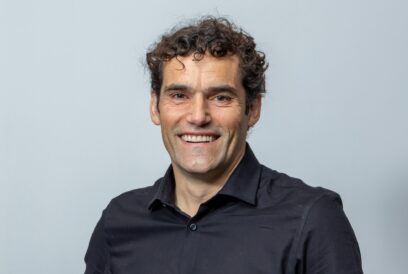
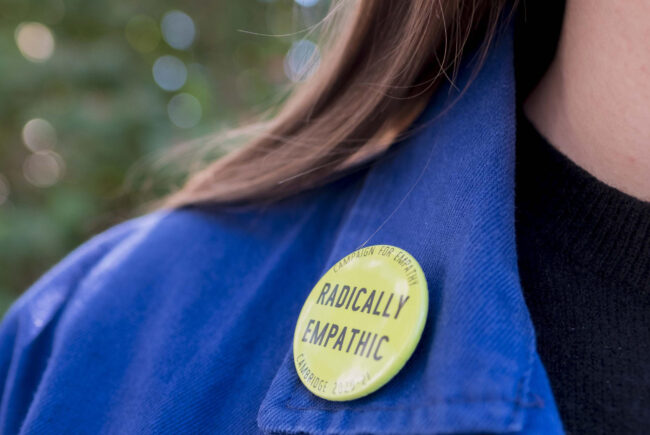
It is natural for people to hold biases. We are hard-wired to empathise only with those who are closest to us and to divide people into ‘us’ and ‘them’. Photo credit: Open House
It is natural for people to hold biases. We are hard-wired to empathise only with those who are closest to us and to divide people into ‘us’ and ‘them’. Photo credit: Open House
Empathy is a necessary skill in the future, when humankind is solving more and more complex global problems together. Increasing empathy in societies has become a more prominent issue.
Former U.S. President Barack Obama has long talked about the “empathy deficit” being a more pressing political problem for his country than the federal deficit. Research shows that levels of empathy have indeed declined in the past decades while people struggle to grasp each other’s perspectives.
Empathy is not just a fuzzy warm nice-to-have feeling but an essential mechanism in our lives and lack of it has a real impact on many aspects of life.
“Empathy is an enabler of a good life and a seamless part of humanity. From an evolutionary point of view, these skills are all about what has been useful to us in the development and survival of humankind,” says Silja Martikainen, a postdoctoral researcher of psychology at the University of Helsinki in Finland.
In neuroscience, the generally accepted definition of empathy is a collection of skills with different aspects. Affective empathy is the ability to emotionally relate to others and to put oneself in another’s position. Cognitive empathy gives us the ability to understand and draw conclusions from the feelings of others and is also related to understanding one’s own feelings. Thirdly, there are empathic deeds, the ability to help and comfort others. Understanding how one feels oneself leads to trying to make someone else feel better and is also rewarding for oneself.
“Empathy does support personal well-being in many ways; it helps mental health, the formation of social relationships and can even further better academic skills,” Martikainen says.
The importance of human skills, those that machines are still bad at, will become increasingly important in the future
So, empathy is important on a personal level but also necessary on a societal level. Research shows that people with better empathy skills solve problems in teamwork more effectively.
“We need empathy for all cooperation and problem-solving. For us to collaborate, we need to be able to understand each other,” Martikainen continues.
As we are constantly being faced with increasingly complex problems such as climate change, which require a wide range of skills to solve them, these abilities are vitally important. Although we are well on the way to digitalisation and automatisation taking over mechanical tasks such as calculating and logic, some skills so far only have human value.
“The importance of human skills, those that machines are still bad at, will become increasingly important in the future,” Martikainen says.
Initiating societal projects on empathy
Last autumn, five international teams of university students, graduates and researchers keen on unravelling sociological dilemmas gathered online for a three-day brainstorming session. The grand mission for the multidisciplinary line-ups was to increase empathy in society.
Not an insignificant problem in a world where polarisation of politics makes it more tempting to divide people simply into allies or enemies and in which modern technology plays an important role in the game.
“Empathy is a change agent and the foundation of a stable society. Acts of empathy vary but they are called into action in encounters and kind deeds between people,” says Linda Lehto, manager of Empathy Movement by the Finnish Refugee Council. The council organised the “Do Empathy Online Challenge” together with Helsinki Think Company and the Finnish Foundation for Media and Development (Vikes).
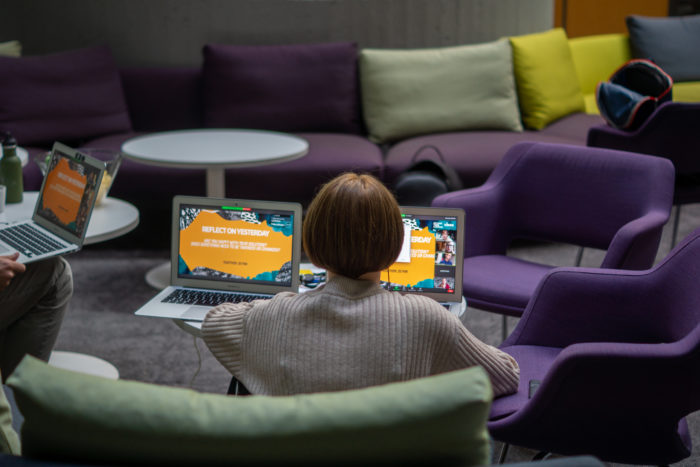
Five teams took part in the “Do Empathy Online Challenge”. Photo: Sanna Kujala
During the event, ideas were refined into concrete projects and included a concept enabling cultural encounters for public spaces and a repeatable plan of a “work festival”, aiming to link international companies and educated refugee jobseekers.
The winning project in the challenge was focused on the gaming world. ‘Guerrilla Empathy’ can provide discussion tools, particularly for young men, and is run by collaborating with e-sporters, game companies and game media.
“The gaming world has problems with hate speech and harassment online. These can be reduced by enhancing empathy in the underlying culture,” says Lehto.
Although the gaming world is not the main target field of work for the Finnish Refugee Council, they are happy to proceed in cooperation with ‘Guerrilla Empathy’ to bring the campaign to life.
“The more empathy we have in our society, the more it spreads to different areas, including encounters with the refugees,” Lehto continues.
Is there empathy online?
For empathy to rise to its potential, curiosity and eagerness to learn more about others in order to understand them better are the keys. On the other hand, everything that estranges and dehumanises other people prevents empathy.
It is natural for people to hold biases. We are hard-wired to empathise only with those who are closest to us and to divide people into ‘us’ and ‘them’. In the online world, this goes to the extreme. Due to algorithms, we are offered stories, people and services that we already like and we encounter fewer people and less news that we have not taken into our ‘bubbles’.
The digital communication environment, which we have become even more familiar with during the past year, also presents obstacles to human interaction. Part of being empathic is listening – really listening. Face-to-face discussions are ideal because you can observe people’s body language while listening. Body language helps to communicate how someone is feeling.
Not being able to look into each other’s eyes hinders the sharing of feelings and a feeling of togetherness.
“It is harder to think of others as human when, online, they are only two-dimensional. When you don’t really see their reactions, you don’t experience their feelings so it is easier to be offensive to others,” Martikainen explains.
Not being able to look into each other’s eyes hinders the sharing of feelings and a feeling of togetherness.
“We read very subtle messages, which synchronise interaction. Facial expressions, gestures, the stressing of words, breathing, even pupil dilation and blinking contribute to the pulse of the interaction.”
In text-based communication, nonverbal signs are totally left out, but they are also limited in video interaction.
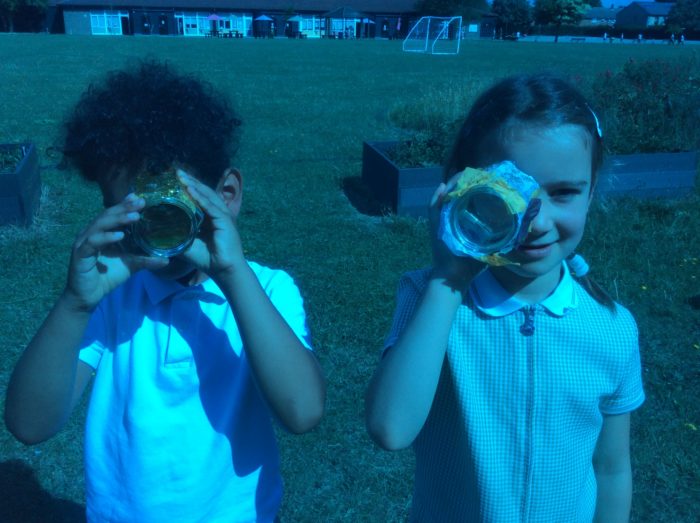
Empathy is not a fixed personality trait, but a set of skills there are ways and means to brush up. Feeding the imagination in different ways strengthens empathy skills. Photo from Campaign for Empathy activities: Open House
We have all probably experienced the situation in an online meeting where the subtle clues of when the other has finished talking or would like to comment are too weak to interpret, and the result is everyone speaking and interrupting each other at the same time.
Martikainen does not want to stigmatise digitalisation only as a bad thing and stresses that digital tools are also a great help.
According to her, there is evidence that the use of social media can also support empathy. It can help to maintain friendships even over long distances and sometimes it is easier to discuss certain subjects or feelings in written form, take chat services for example. Social media offers peer groups easier accessibility than real life.
“Digital technologies are a tool, albeit seamlessly present in our lives, but nonetheless a tool. I don’t think that digital tools will ever replace face-to-face interaction. It is especially important for children because in face-to-face interaction we learn those important human skills.”
It is good to keep in mind that we are still at an early stage with digital tools, which are constantly evolving. We might see a future where empathy, amongst other social skills, is better involved and part of the digital communication.
Designing the building blocks of empathy
Enni-Kukka Tuomala is an artist and designer all of whose activity is centred around empathy. Her projects and artworks vary but the focus of her work is always in expanding our empathic abilities to better understand people who are different from us.
Tuomala saw her latest project begin and end during lockdown. While she was forced to work online and managed to visit the community only once during the project, her theme of work became even more relevant.
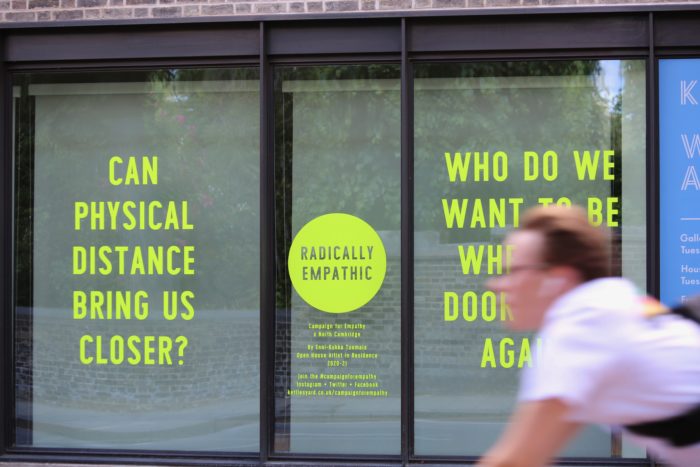
Campaign for empathy in North Cambridge, UK is an umbrella of projects fostering empathy in the community. Photo: Open House
“It has been a real learning experience, because before the pandemic my work was really physical and with people. Now I have been working very closely with the community, but remotely.”
Under Tuomala’s guidance, the community of North Cambridge in the UK was invited to explore the role of empathy in their community, and their empathy skills through art. Local organisations, community groups and individuals have during the past year experienced series of artworks, activities and experiments that aim to foster a sense of community and to increase empathy.
“I call my work the building blocks of empathy. I try to make empathy more tangible and practical.”
The Campaign for Empathy was launched as part of her residence at the University of Cambridge’s contemporary art gallery Kettle’s Yard. The umbrella of projects consists of spatial pieces, installations, audio artwork, art created in collaboration with members of the community and empathy activity kits for children and adults.
“All my work is based on my vision of transforming empathy from an individual feeling to more collective and radical power. Arguably today we need that in the world more than ever. I’m trying to create spaces, experiences, moments and tools to be able to better understand empathy and the direction of our own empathy.”
Empathy is not a fixed personality trait, but a set of skills there are ways and means to brush up. Feeding the imagination in different ways strengthens empathy skills. It has been studied that arts and acting in particular tune empathy.
“Reading fiction supports social sensitivity, which is thought to be part of empathy. Reading the stories of other people helps people put themselves ‘in someone else’s shoes’. Dance and simple synchronic movement such as rocking in a rocking chair also strengthen the sense of belonging,” Silja Martikainen says.
I try to create possibilities for exploring how we feel and how we listen and make ourselves more aware of the empathy gaps we have.
As an empathy artist and designer, Tuomala trusts physical body language, gestures, expressions, shared moments and experiences in the awakening of the empathic side of us. In her previous projects she has, for example, created moments of togetherness or deep listening by having strangers face each other by and inside spatial artworks and holding shared objects.
“I never try to force people to empathise or to do, feel or say something they don’t want to. I try to create possibilities for exploring how we feel and how we listen and make ourselves more aware of the empathy gaps we have.”
Ultimately, the ways to drill empathy skills are quite simple. “True conventional togetherness is the best empathy practice. You don’t need to go to an empathy school. Just being together, doing things and experiencing emotions together, for example between children and parents, develop empathy skills,” says Martikainen.
“Interact with others, be sensitive to what the other might feel. You can never be certain, but try to relate to other people and ask them questions,” Martikainen encourages.
Author


